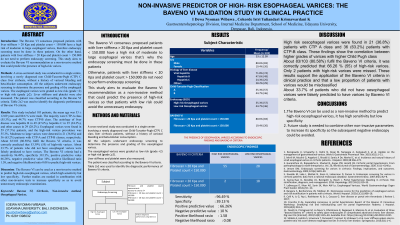Back


Poster Session C - Monday Afternoon
Category: Liver
C0522 - Non-Invasive Predictor of High-Risk Esophageal Varices: A Baveno VI Validation Study in Clinical Practice
Monday, October 24, 2022
3:00 PM – 5:00 PM ET
Location: Crown Ballroom

Has Audio

I Dewa Nyoman Wibawa, MD, PhD
University of Udayana
Denpasar, Bali, Indonesia
Presenting Author(s)
I. Dewa Nyoman Wibawa, MD, PhD1, Cokorde Istri Yuliandari Krisnawardani K., MD2
1University of Udayana, Denpasar, Bali, Indonesia; 2Udayana University Hospital, Udayana University, Denpasar, Bali, Indonesia
Introduction: The Baveno VI consensus proposed patients with liver stiffness > 20 Kpa and platelet count < 150.000 have a high risk of moderate to large esophageal varices, therefore endoscopy screening must be done in these patients. On the other hand, patients with liver stiffness < 20 Kpa and platelet count > 150.000 do not need to perform endoscopy screening. This study aims to evaluate the Baveno VI recommendation as a non-invasive method that could predict the presence of high-risk varices.
Methods: A cross-sectional study was conducted in a single centre, involving a newly diagnosed non Child-Turcotte-Pugh (CTP) C class liver cirrhosis, without a history of variceal bleeding and beta-blocker consumption. All the subjects underwent endoscopy screening to determine the presence and grading of the esophageal varices. The esophageal varices were graded as low risk (grade < 2) or high risk (grade ⩾2). Liver stiffness and platelet were also measured. The patient was classified according to the Baveno VI criteria. Table 2x2 was used to identify the diagnostic performance of Baveno VI criteria.
Results: This study included 103 patients, the mean age was 53 ± 12.09 years and 80.6 % were male. The majority were CTP-A class (55.3%), and 44.7% were CTP-B class. The aetiology of liver disease was hepatitis B in 49 (47.6%), hepatitis C in 25 (24.3%), and other causes in 29 (28.2%). Esophageal varices were found in 59 (57.3%) patients, and the high-risk varices prevalence was 55.3%. Moderate to large varices were detected in 21 (36.8%) and 36 (63.2%) patients with CTP-A and CTP-B classes, respectively. About 83/103 (80.58%) fulfil the Baveno VI criteria, it was correctly predicted that 53.39% (55) of high-risk varices. About 33.7% of patients who did not have oesophageal varices were falsely predicted to have varices. The Baveno VI criteria had a sensitivity 96.49%, specificity 39.13%, positive predictive value 66.26%, negative predictive value 10%, positive likelihood ratio 1.58, and negative likelihood ratio 0.08 to predict high-risk varices.
Discussion: The Baveno VI can be used as a non-invasive method to predict high-risk oesophageal varices, which high sensitivity but low specificity. Further studies are needed in combination with other non-invasive tests to increase specificity so as to avoid unnecessary endoscopic examinations.
Disclosures:
I. Dewa Nyoman Wibawa, MD, PhD1, Cokorde Istri Yuliandari Krisnawardani K., MD2. C0522 - Non-Invasive Predictor of High-Risk Esophageal Varices: A Baveno VI Validation Study in Clinical Practice, ACG 2022 Annual Scientific Meeting Abstracts. Charlotte, NC: American College of Gastroenterology.
1University of Udayana, Denpasar, Bali, Indonesia; 2Udayana University Hospital, Udayana University, Denpasar, Bali, Indonesia
Introduction: The Baveno VI consensus proposed patients with liver stiffness > 20 Kpa and platelet count < 150.000 have a high risk of moderate to large esophageal varices, therefore endoscopy screening must be done in these patients. On the other hand, patients with liver stiffness < 20 Kpa and platelet count > 150.000 do not need to perform endoscopy screening. This study aims to evaluate the Baveno VI recommendation as a non-invasive method that could predict the presence of high-risk varices.
Methods: A cross-sectional study was conducted in a single centre, involving a newly diagnosed non Child-Turcotte-Pugh (CTP) C class liver cirrhosis, without a history of variceal bleeding and beta-blocker consumption. All the subjects underwent endoscopy screening to determine the presence and grading of the esophageal varices. The esophageal varices were graded as low risk (grade < 2) or high risk (grade ⩾2). Liver stiffness and platelet were also measured. The patient was classified according to the Baveno VI criteria. Table 2x2 was used to identify the diagnostic performance of Baveno VI criteria.
Results: This study included 103 patients, the mean age was 53 ± 12.09 years and 80.6 % were male. The majority were CTP-A class (55.3%), and 44.7% were CTP-B class. The aetiology of liver disease was hepatitis B in 49 (47.6%), hepatitis C in 25 (24.3%), and other causes in 29 (28.2%). Esophageal varices were found in 59 (57.3%) patients, and the high-risk varices prevalence was 55.3%. Moderate to large varices were detected in 21 (36.8%) and 36 (63.2%) patients with CTP-A and CTP-B classes, respectively. About 83/103 (80.58%) fulfil the Baveno VI criteria, it was correctly predicted that 53.39% (55) of high-risk varices. About 33.7% of patients who did not have oesophageal varices were falsely predicted to have varices. The Baveno VI criteria had a sensitivity 96.49%, specificity 39.13%, positive predictive value 66.26%, negative predictive value 10%, positive likelihood ratio 1.58, and negative likelihood ratio 0.08 to predict high-risk varices.
Discussion: The Baveno VI can be used as a non-invasive method to predict high-risk oesophageal varices, which high sensitivity but low specificity. Further studies are needed in combination with other non-invasive tests to increase specificity so as to avoid unnecessary endoscopic examinations.
Disclosures:
I. Dewa Nyoman Wibawa indicated no relevant financial relationships.
Cokorde Istri Yuliandari Krisnawardani K. indicated no relevant financial relationships.
I. Dewa Nyoman Wibawa, MD, PhD1, Cokorde Istri Yuliandari Krisnawardani K., MD2. C0522 - Non-Invasive Predictor of High-Risk Esophageal Varices: A Baveno VI Validation Study in Clinical Practice, ACG 2022 Annual Scientific Meeting Abstracts. Charlotte, NC: American College of Gastroenterology.
